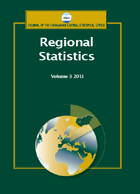The impact of the 2008 financial crisis on household income and wealth in Visegrad countries
The impact of the 2008 financial crisis on household income and wealth in Visegrad countries
Author(s): György Kocziszky, József Benedek, Dóra SzendiSubject(s): Social Sciences, Economy, Geography, Regional studies
Published by: Központi Statisztikai Hivatal
Keywords: financial crisis; household income and wealth; asset loss; Visegrad countries; NUTS 2; recovery of income
Summary/Abstract: Economic history conducting investigations into financial crises of the long 20th century primarily analyses the permanent character of crises and their macroeconomic consequences. Statistics focuses, primarily, on the number of bank failures, corpo-rate bankruptcies, low macroeconomic output (gross domestic product [GDP]), decreased employment rates, increased inflation, and government debts. Both economic history and statistics only deal with the decrease in household income and with losses in their net wealth positions afterwards.The authors of this study investigate the impact of the 2008 crisis on household income and their net wealth positions. They also examine options of restoring household income in Visegrad countries based on the data of NUTS 2 level (Nomenclature des unités territoriales statistiques) territorial units. The authors have used empirical analysis and statistical comparison for the change of the income and wealth situation of the Visegrad countries’ households. The results show that in the 2000s, the growth in the income gap between households slowed down, but after the crisis of 2008, the differentiation of the wealth of households in the region continued. As a result of this crisis, the income differences also started to rise again, which led to even wider gaps in income inequalities. Recovery of income and wealth has begun, but it will take at least 3-4 years to reach the pace of the precrisis growth. In addition, its level could be permanently lower since households and credit institutions behave more cautiously than before the crisis.
Journal: Regional Statistics
- Issue Year: 8/2018
- Issue No: 01
- Page Range: 141-167
- Page Count: 27
- Language: English

